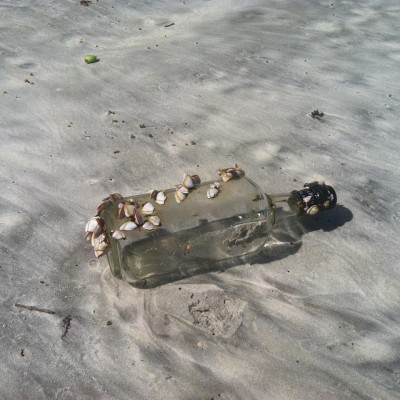 In “Ecofeminism and Wilderness,” Linda Vance believes that Western society defines wilderness by “… the absence of humans, we are saying, in effect, that nature is at its best when utterly separated from the human world. The idea of wilderness is thus an extreme manifestation of the general Western conceptual rift between culture and nature,” (62). Reality television shows, focusing on survival or living off the land, often reproduce this dualistic way of thinking.
In “Ecofeminism and Wilderness,” Linda Vance believes that Western society defines wilderness by “… the absence of humans, we are saying, in effect, that nature is at its best when utterly separated from the human world. The idea of wilderness is thus an extreme manifestation of the general Western conceptual rift between culture and nature,” (62). Reality television shows, focusing on survival or living off the land, often reproduce this dualistic way of thinking.
At the same time they reproduce another of Vance’s concerns, “I would argue that wilderness recreation “re-creates” more than the self: it also recreates the history of the conquest of nature, the subjugation of indigenous peoples, the glorification of individualism, the triumph of human will over material reality, and the Protestant ideal of one-on-one contact with G-d. And as for the elements of physical challenge and risk, I think it goes without saying that they appeal most to those for whom day-to-day mobility is a given, and for whom danger isn’t always close at hand,” (71). However, by presenting this dichotomy, many of the shows also subvert the ideal of untouched wilderness, challenge the notions of human abilities and highlight our lack of embeddedness and embodiment when it comes to survival situations.
Many of these shows indeed reproduce the dualism between nature/culture, man/woman and human/animal as well as conquest, glorification of an individual and triumph over material reality. For example, aptly named, “Man vs. Wild” portrays a disconnected, hyper-masculine, ex-special forces man, Bear Grylls, who often parachutes to his locations, conquering the dangers of the wild through sheer grit, bravery, occasionally some form of ingenuity but often just plain old adrenaline-fueled machismo. If you don’t agree with me, then watch the episode where he gets attacked by bees. His head blows up to the size of a balloon, finally humbling (a tiny bit) his own bravado. I do not like this show for these many reasons.
Yet, most start with a premise that one’s “wilderness ‘recreational’ activities” have gone amuck and now one is caught in a temporary survival scenario. To put it bluntly, we either return to society, we learn to survive where we find ourselves stranded or we die. Surprisingly, I find these shows intriguing.
I can tell you that it’s not for their many faults. First, some survivalists demonstrate killing to show how to kill. For example, a protagonist kills an animal that he could never hope to eat all by himself. Second, there is an overemphasis on needing meat to survive, often concealed under the generic term “protein.” Some shows seem to not count wild edibles as real food. Third, these shows feature a predominance of males with an occasional woman who needs to “learn” these skills. Even with a skilled female, males often take on an inner self-imposed (patriarchal) pressure to provide. Rarely is there a sense of equality. Fourth, heterosexuality is assumed, especially in shows like “Naked and Afraid,” that is besides the problematic premises of the nakedness requirement. Fifth, survival shows often cater to a like-minded male audience and establish the heroic “survival in” and “return from” nature of the (usually) well-to-do (often white, straight, ex-military) man. In addition, these shows are usually so heavily scripted and supervised that they allow for a certain degree of macho reckless behavior and show little concern as to their own impact on the filming location. Finally, most shows gloss over or even fail to mention survival situations particular to women. For example, what do women do when they have their periods; would a woman approach a group of male strangers on the road in order to be rescued or could this lead to further dangers, like rape? I could go on.

Nevertheless, these shows offer us a window into just how culturally constructed our ideas about nature and wilderness are. Take our idealism about pristine wilderness or white sandy beaches for example. Capturing the preponderance of plastic bottles, fishing nets, styrofoam pieces and even refrigerators in these “pristine” locations, it is very clear how every corner of the globe has been affected by our consumerism. While survivalists may demonstrate the “usefulness” of trash in such a scenario, most of them clearly wish it wasn’t there.
Besides contesting our idealism, survival shows illustrate the large gulf between Western/Northern societies and the world we depend on for our every need. Hunting proves routinely impossible and they can only find a few wild edibles; the survivalists struggle with hunger. There is only a contaminated stagnate pool or salty seawater to be found; the survivalists face dehydration. Everything is wet and it’s pouring rain; the survivalists could die of hypothermia without a fire. I could keep going. It is clear that our perceived notion as distinct and separate from nature has produced many societies that need to relearn the necessary survival skills from how to start a fire without matches to what kinds of plants are edible and which ones aren’t.
Yet, most importantly, many survival shows offer us the opportunity for reflection by providing their own commentaries on the following areas of life: how we live separated from nature even when we spend large amounts of time there; how disembodied and unembedded we are; and finally how we overestimate our importance as individuals. “Survivorman” offers the best example of this. Of course, there is no escaping the temporary survival premises of the show, but the philosophical approach and constant reminders to be wary are brilliant. As Les Stroud (aka Survivorman) says, “… the wilderness is neither against you nor for you. It only demands one thing from you if you are going to survive. Respect,” (“Transylvania Part 1,” Survivorman, Season 7 episode 2).

Stroud reflects beautifully on what he has learned about respecting the wilderness from years of experience in it. He stops to appreciate its beauty, at the same time he cautions his viewers that only seeing and valuing nature for its beauty is what often leads one into danger. He brews tea from spruce bows reflecting on the mental comfort such an activity can bring. He re-purposes trash usually with the motto that nothing is wasted. He consistently hesitates to kill animals, always distraught over the difficulty of killing and the blessing of having something to eat. He repeatedly warns of machismo, going out alone, the overestimation of one’s abilities and not being present in the moment or cognizant of the reality of the situation and so much more.
What his show illustrates in my opinion is not human versus nature, but a human being in nature. There is a big difference in that distinction. Respect may be the key component that subverts such dualistic thinking.
Ivy Helman, Ph.D. is feminist scholar and faculty member at Charles University and Anglo-American University in Prague, Czech Republic where she teaches a variety of Jewish Studies and Ecofeminist courses. She is an Associate of Merrimack College‘s Center for the Study of Jewish-Christian-Muslim Relations and spent many years there as an Adjunct Lecturer in the Religious and Theological Studies Department. In addition to teaching and research, Ivy spends considerable amounts of time learning Czech, painting, drawing, creating new kosher delicacies and playing with her dog, Mini, and cat, Gabbi.


Love your thoughts, Ivy. Excellent post.
If we consider our planet Earth as a whole, everything on it is its environment. In that sense, a city is no different than an ant hole and an apartment building is no different than a beehive. We would never separate a beehive or an ant hole from nature in our understanding, just because it was built by a group of beings.
I think we need to consider our cities as part of nature too. There is a difference with the idea of wilderness, however, which we usually understand as devoid of many people. But respect for nature involves cleaning up our cities, creating more expansive parks and public gardens in them, and planting many more trees to line every street, etc. — all of that is so very important in maintaining our relationship with nature and protecting our own health as well. On November 20, last year, New York City celebrated planting literally one million new trees throughout the city in order to increase what they call their “urban forest.”
LikeLike
Thank you for this post, Ivy. Years ago, I tried to get into watching “Survivor” with a friend who was absolutely crazy about it. I remember immediately disliking it, thinking why do humans have to compete with nature? You have helped me understand more about why such shows don’t appeal to me.
LikeLike
A wonderfully thought-provoking post. Thank you!
LikeLike
well said syster! everything I wanted to say about a so called survival show! :)
LikeLike
Well said Syster! Eveything I always wanted to say about a so called survival program! :)
LikeLike
Love this analysis Ivy! thanks for the layered insights about masculinity, interdependence vs domination of nature.
LikeLike